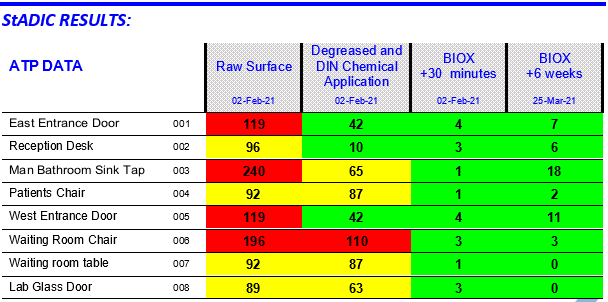HEALTHCARE CASE STUDY
Standard methods for cleaning clinic environments help reduce many organic materials on “high touch point” surfaces (“HTPs”). However, usually these surfaces become re-contaminated within seconds. A long-lasting oxidizing agent such as BIOX, bonded to a surface, has proven to promote a higher level of cleanliness.
ST. ALBERT DENTURE AND IMPLANT CLINIC
St. Albert Denture and Implant Clinic (StADIC) is a family owned business in St. Albert, Alberta, specializing in designing and implementing dentures and implants for patients. StADIC has implemented and maintained a strict daily disinfection and cleaning program to ensure the safety of their patients who are typically elderly, and staff. On February 2nd, 2021, representatives from StADIC were present for the demonstration and tests described hereafter.
INTRODUCTION:
BIOX is a protective surface coating composed of nanoparticles of Titanium Dioxide. When the protected surface is exposed to light a chemical reaction called photocatalytic oxidation occurs. This oxidation process creates highly active oxidant known as free radicals, which, upon contact bind and break down organic materials such as: dirt, oil, volatile organic compounds, and biological organic particles. Nanoparticles are so small they create a very high contact area, promoting recurring reactions, resulting in a self-cleaning property. The effect is a cleaner surface, freshened air, and less harmful particles present for a sustained period.
GOAL:
To demonstrate the effectiveness and durability of a BIOX Protective Coating within a clinical environment as an effective addition to standard cleaning procedures.
METHOD:
The demonstration date was February 2nd, 2021 at StADIC.
Using electrostatic sprayers, various high contact surfaces throughout the clinic, including reception desks, patients’ chairs, and bathrooms were treated with BIOX under recommended application guidelines. Surfaces were tested using a Hygenia SystemSURE Plus (Adenosine Triphosphate or “ATP”) meter to detect the presence of microbial growth before and after BIOX application. An additional test was performed 6 weeks post application to demonstrate durability.
MEASUREMENT:
Verification of the effectiveness of BIOX application was determined using the SystemSURE Plus Cleaning Verification System. The ATP measurement is an easy-to-use test that detects adenosine triphosphate, the energy molecule in all living organisms including harmful residues and bacteria, through the measurement of Relative Light Units (“RLUs”).
The International Sanitary Supply Association (“ISSA”) has developed “The Clean Standard”, a guide to establishing a framework for objectively assessing cleaning effectiveness in facilities (www.issa.com/cleanstandard). The Clean Standard recommends the use of ATP cleaning verification to assess and improve the effectiveness of cleaning processes and products to assist facility administrators in understanding and determining levels of cleanliness.
Under the standard, a clinic identifies HTPs within the clinical facility. Suggested HTPs are reception areas, patient chairs, lab tables; restroom stalls and stall doors; and sink fixtures and sink surroundings. Clinics may wish to include other HTPs based on experience or unique circumstances such as patient waiting areas, staff areas, door handles, doors, and chairs.
The ISSA references the Hygiena SystemSURE Plus monitor and identifies Pass and Fail ranges of 60 and 100, respectively, for standards set out in the ISSA Surface Protection Program for Facilities. Any score of 60 or less is a considered a pass, scores from 61 to 99 are a caution, and any score greater than 100 is a fail.

ANALYSIS:
ATP measurements on all surfaces prior to BIOX application were classified as a WARNING or FAIL according to ISSA standards. Even though StADIC has a rigorous cleaning protocol, including ozone disinfection, some of the variables that may affect surfaces cleanliness include, duration of time between cleanings, cleaning products employed, and quantity of biological contacts (people) between cleanings.
Treating a surface with a long lasting, self-cleaning oxidant such as BIOX TD, will help control and limit biological existence on a surface.
Through this study, BIOX has shown to enhance cleanliness on all surfaces to which it was applied and continues to remain effective months after initial application.
CONCLUSION:
BIOX surface protection is a valuable addition to help enhance existing protocols in place for the cleaning of clinical workplace environments. BIOX provides a more efficient, cleaner and longer-period effectiveness cleaning protocol.
